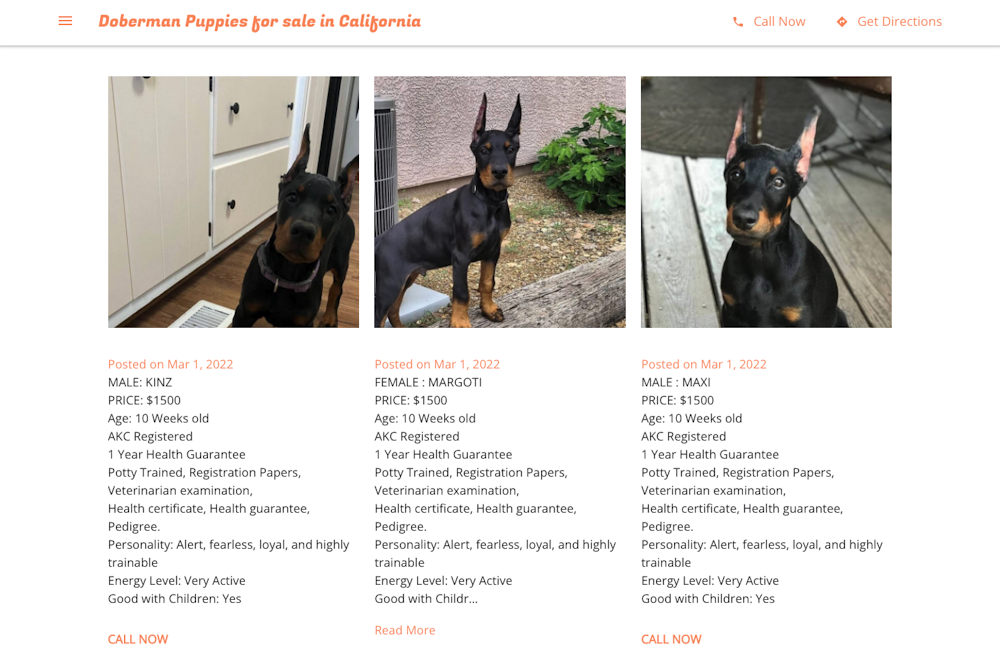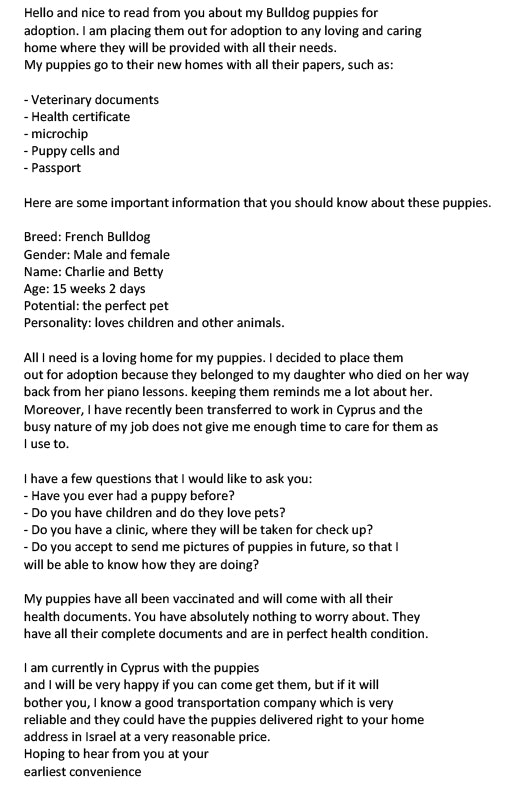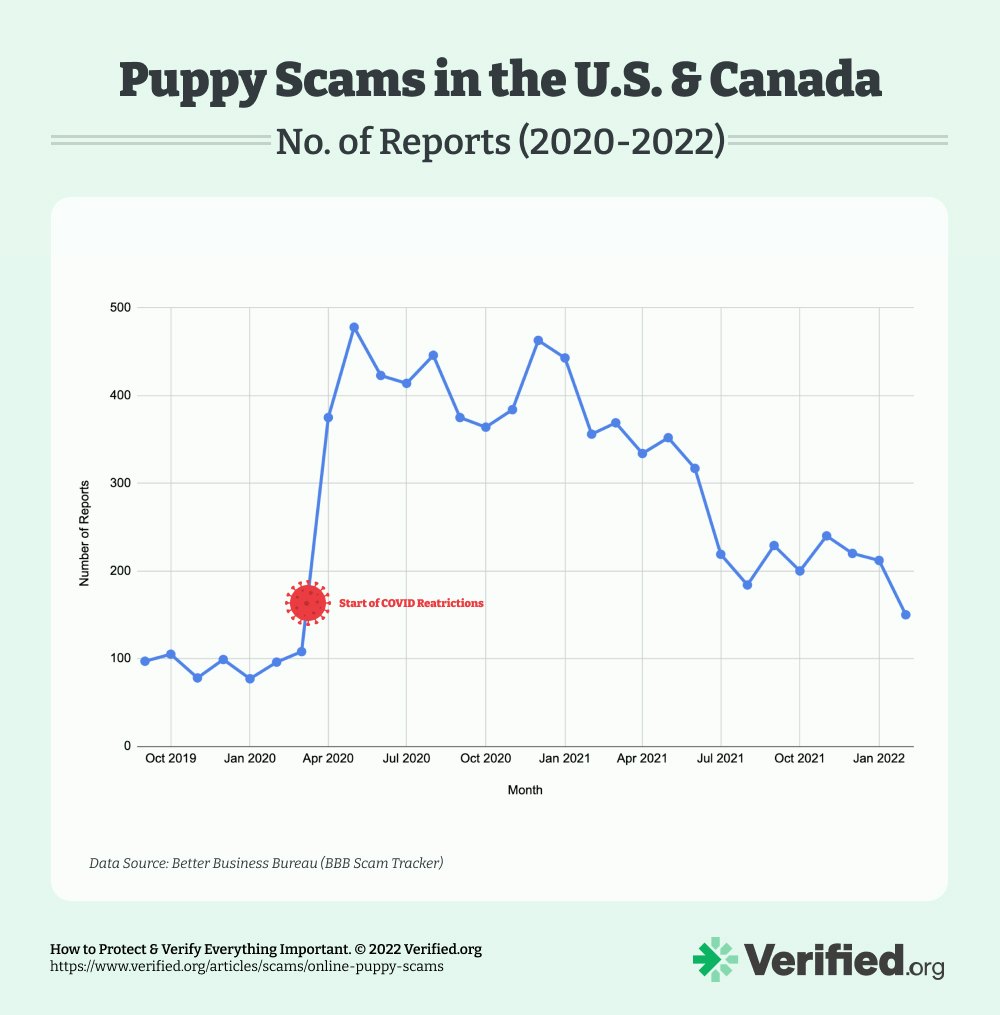- What Are Online Puppy Scams?
- Beware of Fake Breeder Websites
- Red Flags of Online Puppy Scams
- How to Beat Online Puppy Scams
- Why You Should Consider Adopting
- Have You Fallen For An Online Puppy Scam?
- Frequently Asked Questions
Online puppy scams aren't new, but with most of us spending more time at home over the past 24 months, the demand for new puppies and the number of people getting scammed have skyrocketed. According to BBB Scam Tracker, over 4,300 online puppy scam reports were made in 2020, and the trend continued through 2021.
For the 3 months before the start of the COVID-19 pandemic (Jan-Mar 2020), the average number of reports to BBB Scam Tracker was 93 per month. The number of scams (Apr-Jun 2020) rose to an alarming average of 425 reports per month during the pandemic—a 357% increase.
What Are Online Puppy Scams?
Scammers impersonate genuine dog breeders to trick people into paying money for puppies that don't exist. People who reported puppy scams to BBB searched for pets online via Google searches or sites like Craigslist, Facebook, and Instagram.
People that had been scammed said that when they inquired about the puppies, the sellers responded quickly, often with additional photos and videos of the puppy and even discounted prices. (In some cases, the deal seemed too good to be true.) However, they would never let them see the puppy in person or via video.
The scammers were quick to pressure them into paying an upfront deposit via untraceable means—like wire transfer or gift cards—which they steal and then disappear.
It's difficult to spot a scam from the listing itself, as the pet scammers will make it look legitimate enough that you contact them. Unfortunately, it's not until you start communicating with them that you will spot the scam. Here's how most online puppy scams work.

You Find a Great Deal, But the Seller is Pushy
Pre-pandemic, scammers were focused on trying to trap their victims using online classified websites like Craigslist or Facebook Marketplace. They advertise pets at low prices, using language like "pet for a dirt-cheap, shockingly low price, negotiable price" in the ad.
The demand for puppies during the pandemic increased so much that scammers didn't have to rely on low prices. Instead, they focused on limited supply, taking advantage of buyers thinking they were competing with each other to secure a dog. Sellers were quick to ask for payments of up to $1,000 upfront as a security deposit.
When you inquire about the ad, the seller may provide an all too convenient reason why they must sell the puppy quickly, giving you a reason for the meager price. The seller will seem very pushy at this stage and won't hesitate to ask for payment.
They Won't Let You See the Puppy in Person
Before buying a puppy, you'll usually want to see it in person. However, in this online puppy scam, the seller will have any number of excuses as to why they can't meet in person and will have to just ship you the puppy. Whether they're out of town or have some medical emergency, they'll have an excuse and try to convince you everything is legit.
Example Listing8 week old labrador puppy for sale - $200
Puppy is vaccinated and will come with all the official papers. We can also deliver to your address to make the transaction easier and convenient.
The puppy was given to me but I am going on military deployment and will not be able to look after it or meet you in person as I will be out of town. I have a reliable transportation I will use to ship you the puppy to your door.
They Request Payment Using a Non-Standard Method
You agree to the sale price and send money to the seller. The seller will usually request a money transfer via a non-trackable or unprotected transfer, such as Zelle, Western Union, MoneyGram wire transfer, or payment apps.
When the dog is supposed to be shipped to the new owner, people reported that they received a call from a fake shipping company who demanded additional payments of up to $1,500 via non-trackable transfer. They claimed it was needed to cover the cost of things like:
- Insurance
- A travel crate
- Vaccinations
- Sedatives to transport the puppy
Victims were told a variety of stories to entice them to pay, including that:
- USDA requires it
- It was fully refundable
- They would be charged $30 per day until the puppy was shipped
- They would be reported for animal cruelty
- They would send the dog to a shelter if they didn't pay
You Send the Money but Never Get the Puppy
After your payments have gone through, you send emails, texts, or even call the buyer, letting them know you have not received the puppy or any further information about how to get the puppy. You won't hear back from the seller because you've been scammed at this point. They've taken off with your money, and there was never a puppy in the first place.
Victims have reported losing from $500 to over $5,000 depending on how early they figured out they were being scammed.
Beware of Fake Breeder Websites
Many people start with a search engine when looking for a puppy. Scammers make convincing-looking websites that, on the surface, look legitimate. They come complete with:
- Cute pictures of puppies (that they don't actually have)
- Fake customer testimonials
- Legitimate sounding health guarantees
- Shipping information
This is all designed to pull on your heartstrings and suck you in. So let's look at a real example of a Doberman puppy website and the clues that give away that it is a scam.
How to Identify a Fake Breeder Website: A Checklist
- Look for a published address and phone number and check if there is a physical business at that location.
- There is no location information on this site.
- Look up their domain registration details on https://lookup.icann.org/lookup. This can tell you when the site was registered, which country it was registered in, and sometimes, who owns the domain.
- This site was registered in 2021 in Iceland.
- Check for grammatical errors.
- This site has quite a few errors, including a reference to Dairy Cattle on the health guarantee page.
- Dog breeders who have more than 4 breeding females and sell puppies in the U.S. must be licensed by the Department of Agriculture (USDA). There are over 5.5k licensed breeders in the U.S., and the USDA is responsible for compliance with regulations. You can check if the breeder is licensed on their website using the USDA Animal Care Public Search Tool. Reputable breeders may also be registered with the American Kennel Club (AKC).
- This site has no details of a USDA license or association with the AKC.
- Do a reverse image search on the images used. Hover over the image, right-click and select "Search Google for Image." If you see multiple sites using the same image, it is a red flag that it might be a fake.
- Images from this site showed up on multiple other sites with slight variations to the dogs' names, and the photos are cropped differently.


How to Find a Trustworthy Breeder
Nina Thompson, Director of Public Relations at the San Diego Humane Society, says it's important to get your pet from a reputable breeder. "Reputable breeders are committed, talented and caring individuals who are devoted to their breed," she says.
"A good, responsible breeder cares deeply about his or her breeding stock and their offspring, is up to date on the latest medical and behavioral issues concerning that breed, will responsibly manage and try to eliminate congenital issues, and will stand behind the sale of that animal for his/her life."
Thompson recommends people do their research to weed out the good breeders from the bad. She says, "One important indication of a responsible breeder is if you get to see how the animal has been raised with their mother (and possibly father too)."
"Never buy a pet from a parking lot or random location, where you cannot track the origins of the pet," Thompson advises.
Red Flags of Online Puppy Scams
Although some online puppy listings may seem very legit at first, it's essential to be aware of the red flags once you start communicating with the seller. Here are some warning signs of a scam that should make you back out (or, at the very least, think twice) about the transaction.
Their Website is Missing Important Information
Be careful if the website doesn't list a physical address for the breeder, and there are spelling or grammatical errors on the pages. It could be a scam.
Seller Does Not Accept Cash
A common sign of a scam is a seller unwilling to accept cash, only accepting wire transfers or similar forms of direct payment that can't be reversed.
Inability to See the Puppy in Person
A huge red flag is that the seller won't show you the puppy in person. Instead, they might use excuses like they are out of town for work or live in a different state. Even if you offer to travel to pick the puppy up in person, they will offer excuses for why that cannot happen.
If the seller keeps refusing to let you see the puppy in person, try FaceTime, Zoom, Google Meet, or some other form of video chat to see the puppy. If they still refuse, then it's most likely a scam.

Additional Fees
If the pet is being shipped to you, you may be asked to pay for insurance, a temperature-regulated crate, paperwork, or other fees. The seller/scammer may also ask for extra money to cover veterinary costs. If these were not discussed beforehand, they should raise a red flag. The scammer will try to get as much money from you as possible.
How to Beat Online Puppy Scams
The best way to avoid puppy scams (and online pet scams in general) is never to transfer money to a seller before you have the puppy. Instead, only hand over the money once you have the puppy in your hands when buying a puppy online.
- Get a puppy locally or from a trusted marketplace:
- Your puppy will be around for a long time, so it makes sense to visit local breeders in person and make sure it is a good fit for you and your family.
- Websites like AKC Marketplace only list puppies from registered litters, so you know that you won't get scammed.
- Before you make your decision, consider dropping into your local shelter (e.g., the Humane Society). You might just find the perfect dog at a fraction of the price, and you can feel good that you are giving them a home.
- Check the website registration credentials:
- Using a site like https://lookup.icann.org/lookup, you can enter the URL of the breeder's website and find out when the site was registered and where.
- Recent registrations that are overseas should be treated with suspicion.
- Confirm the breeder's address:
- Always get the physical address of the breeder and check that there is a legitimate business at that location.
- Check that the breeder is licensed or registered:
- Breeders with 4 or more breeding females must be licensed by the USDA. Check for registration details using the USDA Public Search Tool (note it is an excel sheet that you have to download). You can filter by state to narrow down the list).
- Breeders can also register with the American Kennel Club (AKC). ACK registration ensures that the breeder meets specific standards and that the pedigree of the puppies is documented.
- Most breeds have national clubs, which is another good place to find a verified breeder.
- Ask to see the puppy in person:
- Never hand over any money until you're able to see the puppy for yourself.
- Use modern technology to your advantage. If they're not located locally, ask to video chat with the seller so you can see the puppy and ensure that it's not a scam.
- Do a reverse image search:
- Using Google Chrome, right-click on the image of the puppy and then click "Search Google for Image." You'll be able to see if that same picture has been used before for a different listing or on another website. This will help you tell if the puppy listing is legit or if the seller has just used someone else's picture.
- You can do the same check on any images on the site, including pictures of people used in testimonials or staff pictures on about us pages.
- Do your research:
- Ask the seller about the puppy, its breed, and its origin. The seller should have information about the puppy's parents.
- Check other sites (e.g., accredited breeder sites) to find the average price for a puppy of this breed. If the puppy listed is far cheaper than the regular asking price, it may be a sign of a scam.
- Pay with cash or credit card:
- Paying with cash means you will meet the seller in person and hand over the money when they give you the puppy.
- If the seller isn't local (and you trust them enough to pay them before getting the puppy), using a credit card may be the safest option. Many credit card companies allow you to dispute fraudulent transactions and get your money back. However, many private sellers won't accept credit card transactions, so it's still best to only buy locally and pay with cash when you get the puppy.
Don't Hand Over Any Money Until You Pick Up the Puppy
The safest thing to do is to see and pick up the puppy in person and give the money to the seller once you have it. If the seller refuses to allow you to pick the puppy up yourself, find a puppy elsewhere as it's likely a scam.
Why You Should Consider Adopting
According to the San Diego Humane Society, adopting a pet is beneficial for a variety of reasons, including:
- Adoption is more affordable than purchasing a pet.
- By opening your home to an animal, you'll be helping to create space in the shelter for other animals in need.
- You know you're getting an animal who has been assessed behaviorally and medically.
Thompson adds that the San Diego Humane Society offers an adoption guarantee, training advice, pet supplies, and educational information to support families for the pet's entire life.
"You can also call our Behavior Helpline to speak with an expert about any behavior or training concerns," she says. "Behavioral challenges are one of the leading reasons why pets are relinquished to animal shelters. We make every effort to help reduce those numbers by offering proper training support and ensuring that everyone in the family is ready to help in creating a successful transition."
San Diego Humane Society's Adoption Guarantee allows families to return the pet to the organization if it's not a good fit. "If for any reason the adopter decides the adopted pet is not a successful addition to their home, we positively encourage the adopter to return their pet to any of our campuses without judgment or criticism," Thompson says. "You don't need to turn to any other organization; just bring the pet back to us."
Have You Fallen For An Online Puppy Scam?
The ability to get your money back depends on how you paid the scammer. Unfortunately, if you paid via wire transfer, Western Union, or MoneyGram, you probably won't be able to get your money back.
If you paid through a payment app like PayPal or Venmo or by credit card, you could make a fraud claim and request the payment to be reversed or refunded; however, it's not always guaranteed.
Keep a Record of Everything
When you start thinking that you could be getting scammed, start recording as much as you can with screenshots, emails, text messages, and any other information exchanged with the scammer.
Use this information when you report the fraud to the website and authorities.
Report an Online Puppy Scam
Depending on which site you bought your puppy from, you can report the scam to:
- The Federal Trade Commission (FTC) or call 877-FTC-Help
- The Better Business Bureau (BBB)
- Facebook Marketplace
- Craigslist
- eBay: Click "Report this item" on the post itself
How Others Have Fallen for this Scam
If you've unfortunately had your money stolen by an online puppy scammer, you're not alone—there are countless tales of others who have also been tricked across the country.
A man in Kansas was trying to buy a French bulldog and lost $940 in the process. He used what he thought was a legitimate website; however, it was later discovered to be fake.
In another incident, a woman in California was asked to pay $600 in gift cards for a Yorkshire Terrier, then $750 for pet insurance, and $850 for a regulated crate. In the end, she refused to pay the additional costs but never received a refund for the initial amount she paid for the puppy.



Comments